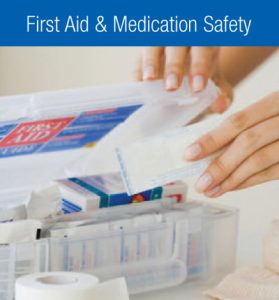
Being in charge of your family’s health is a full-time job. There are always scrapes, stings, minor burns, and other emergencies that need to be addressed. The best way to tackle these problems is to prepare for them before they occur by investing the time to learn about first aid techniques and medication safety to make your home a safe haven.
Dangerous situations can happen anytime and virtually anywhere. In Canada, in most areas emergency assistance can by reached by dialling 911 on any telephone, including pay phones and cellular phones. Everyone in your household, even young children, should be instructed to call 911 in case of emergency. If 911 service is not available in your area, find out the number to call in emergencies and post it—along with other emergency information, such as doctor’s name and phone number—near your telephone for easy reference. Also keep your London Drugs pharmacy number by the phone. Our pharmacists are medication experts who can answer your questions whenever you have them—not just in emergencies.
Consider taking a first aid course from an organization such as St. John’s Ambulance or the Red Cross. This will give you the opportunity to practice your first aid skills in a calm environment so that you’ll be better prepared if an emergency does occur. You may also want to stop by your local bookstore and pick up a good first aid manual for your home and car.
Most first aid situations around the home aren’t emergencies and don’t require a 911 call. They are usually the minor cuts, bruises, and burns that are part of everyday life. Here are some tips for dealing with some of the more common situations.
Burns
Minor, or first-degree, burns usually turn the skin red and can sometimes cause swelling and pain. In the event of a minor burn, take the following steps:
- Cool the burn. Hold the burned area under lukewarm running water for 15 to 30 minutes. Cooling the burn reduces swelling by taking the heat away from the skin. Don’t put ice on the burn, as this may cause frostbite, further damaging the skin.
- Apply lotion. Once a burn is completely cooled, apply an aloe vera lotion, an antibiotic ointment, or a moisturizer to prevent dryness and make the injury feel more comfortable. However, do not coat the burn with butter or a thick ointment such as petroleum jelly, because this traps the heat in the skin.
- Cover the burn. Wrap a sterile gauze bandage loosely around the burned area. Bandaging keeps air off the area, reduces pain, and protects blistered skin.
Minor burns usually heal in about one to two weeks. Watch for signs of infection such as increased pain, redness, fever, swelling, or oozing. If infection develops, seek medical help immediately.
Cuts and Scrapes
Most small cuts and scrapes don’t require a trip to the emergency room, but it is important to care for them properly to avoid infection and other complications. The following guidelines can help you treat simple wounds:
- Stop the bleeding. Use gentle pressure applied over a clean cloth or bandage.
- Clean the wound. Rinse the wound with clear water; soap may irritate the injury.
- Apply an antibiotic. After you clean the wound, apply a thin layer of antibiotic
cream to help keep the surface moist and kill bacteria that could cause infection. - Cover the wound. Bandages help the wound stay clean, keeping harmful
bacteria out. - Change the dressing. Change the bandage at least once daily to keep it clean
and prevent infection. - Get medical treatment for deep wounds. A wound that cuts deeply through the skin may require stitches. If in doubt, see your doctor immediately.
- Watch for signs of infection. Visit your doctor if the wound doesn’t heal properly or if you notice any redness, warmth, or swelling.
- Get a tetanus shot. Doctors recommend getting one every ten years.
Poisoning
Keeping dangerous substances locked away is the best way to prevent poisoning. However, if you suspect someone has been poisoned, look for the following signs:
- Burns or redness around the mouth and lips.
- Breath that smells like chemicals such as gasoline or paint thinner.
- Burns, stains, and odours on or around the person.
- Vomiting, difficulty breathing, sleepiness, confusion, or other unexpected signs.
If you believe someone in your family has been poisoned, follow these steps:
- Call your local poison control centre and follow their instructions. Directions on the product label telling you what to do may be inaccurate or out of date.
- If the victim is unconscious or has swallowed a substance that is acidic, caustic, or has a petroleum base (such as gasoline or household cleaners), get the victim to the hospital immediately. Do not induce vomiting.
- If the victim has not passed out and if the substance is something that is normally swallowed (such as medicine), the poison control centre may tell you to induce vomiting.
- Get medical attention immediately. If you have identified the poison, bring the container with you. If you don’t know what the poison is but the person has vomited, bring a sample of the vomit with you for analysis.
Medication Safety
Chances are your family has a cabinet full of medications—from over-the-counter products to prescription drugs. Lurking in the back corner of your medicine cabinet may be some expired medications, and perhaps some prescription drugs you no longer use.
An important step in the proper use of medications is to educate yourself about the specific drugs you and your family are taking. All of your family’s medications need to be carefully organized to avoid dangerous mistakes. Here are a few tips to help keep you and your family safe:
- Storage: Ask your doctor or pharmacist for directions on how to store your medications. Certain medications need to be refrigerated and others should be kept in a cool, dry place. Make sure that all medications are in child-proof containers and are stored well out of your children’s reach.
- Drug interactions: If you’re taking more than one medication, ask your pharmacist to check for any possible drug interactions.
- Side effects: If you develop what you think is a side effect, contact your doctor or pharmacist immediately. There may be another medication with fewer side effects that can be substituted.
- Allergic reactions: Allergic reactions from medications may include difficulty breathing, skin rashes, itching, swelling, racing heartbeat, nausea, severe diarrhea, and feeling faint. Tell your doctor or pharmacist if you experience any of these symptoms after taking a new medicine. If the reaction involves difficulty breathing, call for emergency assistance immediately.
- Expiry dates: Unused and expired medications can be dangerous. Do a yearly inventory of your medicine cabinet and dispose of outdated or unused medications.
- Never share: The medications prescribed by your doctor were meant to treat your particular medical problem. Never share your medication with anyone else.
- Follow directions: Read the labels carefully and follow the directions to the letter. Be sure to finish the full course of your medication. Stopping a medication too early can cause the illness to return or make it more difficult to treat.



